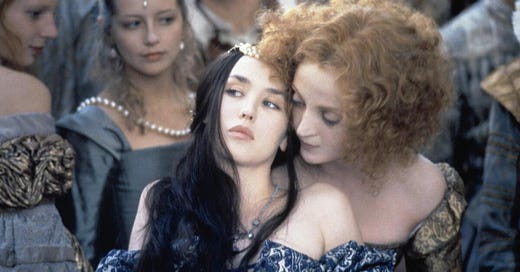In case you were wondering, The Count of Monte Cristo is one of my favorite books—which isn’t so highbrow as it might sound. Despite its length, it reads like a fairy tale, a thriller, expertly engineered (or rather, serialized) to hook you, to seize you, to sweep you across France and Italy and the blue breadth of the Mediterranean, till all that’s left of you is a puddle, a pulp—beaten and battered but at peace with the full spectrum of the human spirit. Maybe it’s not a perfect book (ahem, Sinbad the Sailor), but there’s certainly something all-encompassing, or anyway, complete about it—which is maybe not the case with Alexandre Dumas’ other most famous work, The Three Musketeers, a far scrappier (dare I say slapstick) romp, whose heroes aren’t concerned with honor or revenge so much as tricking ladies (of all ages) into buying them clothes. Which, don’t get me wrong, is delightful in its own right! My point, I think, is that I (thought I) felt comfortable with Dumas—or I generally considered him a safe bet—so a few years ago, given the daunting task of choosing a beach read for (what would turn out to be) an emotionally soupy week in Cape Cod, I chose La Reine Margot (or Queen Margot), which a bit of light research informed me was Dumas’ other, other great work. Queen Margot is essentially a piece of historical fiction, which doesn’t, like The Three Musketeers, use fictional characters to dance round the figures of the time, but follows those figures directly—namely Marguerite of Valois, a 16th century princess whose political marriage places her at the heart of France’s (pretty bloody) civil war. But when I folded open my beach chair, touched up my sunblock, and finally cracked open Queen Margot, I found myself immediately and irremediably lost. I slipped and slid in a mire of French names (Anjou! La Môle! Henri de Bourbon!) as I desperately tried to orient myself against the Catholics and the Huguenots, and the Huguenots and the Catholics. Maybe it would’ve gone down easier if I had an écolier’s knowledge of the French Reformation, or maybe I’m just not a very good reader anymore (thx Steve Jobs). Either way, I read the same ten pages over and over in the hot sun, till finally, I gave up and switched to refreshing my e-mail or something depressing like that.
All of which is to say! I was pretty excited to check out Queen Margot, director Patrice Chéreau’s 1994 adaptation starring the ageless Isabelle Adjani—if just to finally figure out what, exactly, was going on. But disappointingly (or lol, maybe reassuringly), I found myself in the same state of sweaty confusion I’d experienced on the beach—a barrage of French faces, it turns out, doing little to elucidate the barrage of French names. Now, before I talk too much shit, it should be said that the production here is, just, gorgeous, with enough ruffs and farthingales to make Elizabeth: The Golden Age blush. It’s hedonistic excess with some very 90’s flair: the men tear off their shirts at the slightest provocations, heaving their hairless chests and tossing their Brad Pitt hair as Adjani swirls past them in a seemingly constant state of climax. But for all the attention paid to the costumes and scenery, I’m afraid very little is paid to the plot—which is a problem, it turns out, for a story with so much of it. There’s no evolution to our heroes: at one moment, Marguerite’s a party girl with no agenda beyond getting off, and in the next, she’s a beacon of self-sacrifice and religious tolerance; the king of the Huguenots is betrayed by the Catholics at every turn, then shrugs, halfway through the movie, and converts. Only the broadest, most dastardly characters (that is, the Medicis) have any political and/or emotional consistency, but they might as well be cartoon vampires (though I will say Virna Lisi plays queen of the damned with relish). By the end, I somehow felt I had less of a grasp on the French Reformation, or really, why Marguerite’s a meaningful historical figure at all. But maybe I need the book to make sense of the movie to make sense of the book. Or idk—maybe it’s time I move on to The Man in the Iron Mask.
Next time!




How reassuring to learn that it was history itself, not literacy, that undid you!